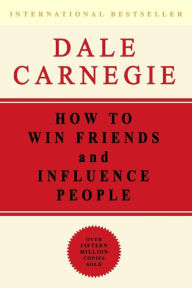2. How To Win Friends and Influence People - Dale Carnegie (📖)
23 Dec 2016
rating 10/10
Reading Notes:
Criticism is futile. Because it puts a person on the defensive and usually makes him strive to justify himself. Criticism is dangerous, because it wounds a person’s precious pride, hurts his sense of importance and arouses resentment.
When dealing with people, let us remember we are not dealing with creatures of logic. We are dealing with creatures of emotion, creatures bustling with prejudices and motivated by pride and vanity.
Principle: Don’t criticize, condemn or complain.
Dr. Dewey one of America’s most profound philosopher said that the deepest urge in human nature is “the desire to be important”.
William James said, “The deepest principle in human nature is the craving to be appreciated”.
It was this desire for a feeling of importance that led an educated, poverty-stricken grocery clerk to study some law books he found in the bottom of a barrel of household plunder that he had bought for fifty cents. You have probably heard of this grocery clerk. His name was Lincoln.
If you tell me how you get your feeling of importance, I’ll tell you what you are. That determines your character.
Why do people go insane? People who go insane find in insanity a feeling of importance that they were unable to achieve in the world of reality.
“I consider my ability to arouse enthusiasm among my people,” said Schwab, the greatest asset I possess.
There is nothing else that so kills the ambitions of a person as criticism from superiors.
Principle: Give honest and sincere appreciation.
“If there is any one secret of success, “ said Henry Ford, “It lies in the ability to get the other person’s point of view and see things from that person’s angle as well as from your own.”
Owen D. Young, “People who can put themselves in the place of other people, who can understand the workings of their minds, need never worry about what the future has in store for them.”
If out of reading this book you get just one thing – an increased tendency to think always in terms of other people’s point of view, and see things from their angle – if you can get that one thing out of this book, it may easily prove to be one of the building blocks of your future.
“Arouse in the other person an eager want. He who can do this has the whole world with him. He who cannot walks a lonely road.”
Principle: Become genuinely interested in other people.
“Everybody in the world is seeking happiness – and there is one sure way to find it. That is by controlling your thoughts. Happiness doesn’t depend on outward conditions, it depends on inner conditions.”
It isn’t what you have or who you are or where you are or what you are doing that makes you happy. It is what you think about it.
“There is nothing either good or bad, “said Shakespeare, “but thinking makes it so.”
Abraham Lincoln once remarked that “most folks are about as happy as they make their minds to be.”
Remember that a person’s name is to that person the sweetest and most important sound in any language.
Readers digest once said: “Many persons call a doctor when all they want is an audience.”
So if you want to be a good conversationalist, be an attentive listener. To be interesting, be interested. Ask questions that other persons will enjoy answering.
Remember that the people you are talking to are a hundred times more interested in themselves and their wants and problems than they are in you or your problems.
Be a good listener. Encourage others to talk about themselves.
The most royal road to a person’s heart is to talk about the things he or she treasures most.
Talk in terms of other person’s interests.
Make the other person feel important – and do it sincerely.
Ben Franklin used to say: If you argue and rankle and contradict, you may achieve a victory sometimes; but it will be an empty victory because you will never get your opponent’s good will.
The only way to get the best of an argument is to avoid it.
Lord Chesterfield said to his son: Be wiser than other people if you can; But do not tell them so.
Show respect for the other person’s opinions. Never say, “You’re wrong.”
Say about yourself all the derogatory things you know the other person is thinking or wants to say or intends to say – and say them before that person has a chance to say them.
If you are wrong, admit it quickly and emphatically.
Let the other person do a great deal of the talking.
Three-fourths of the people you will ever meet are hungering and thirsting for sympathy. Give it to them, and they will love you.
Dr. Arthur I. Gates said in his splendid book Education Psychology: “Sympathy the human species universally craves. The child eagerly displays his injury; or even inflicts a cut or bruise in order to reap abundant sympathy.”
Be sympathetic with the other person’s ideas and desires.
Give the other person a fine reputation to live up to.